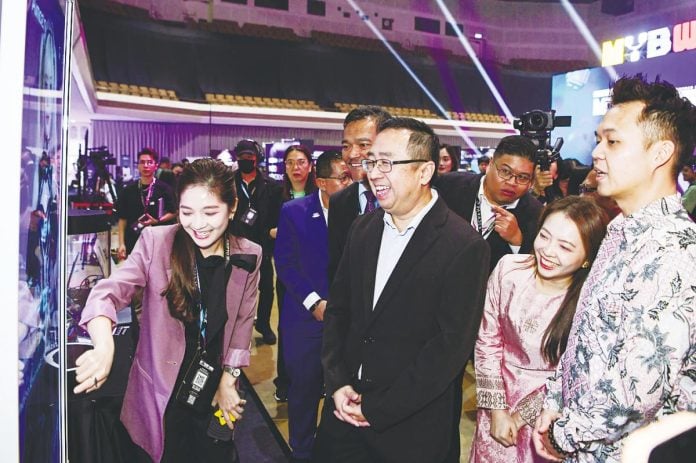KUALA LUMPUR: Malaysia is laying the groundwork to establish itself as a regional leader in digital trust architecture with the launch of Malaysia Blockchain Infrastructure (MBI).
This national initiative establishes the foundation for a future where public services are tamper-proof, halal products are traceable from farm to fork and businesses operate with full transparency and cost efficiency on secure digital platforms.
Minister of Science, Technology, and Innovation Chang Lih Kang said the MBI initiative signals Malaysia’s commitment to anchoring its future economy on interoperability, data integrity and innovation, thereby creating a trusted, technology-driven ecosystem across the public and private sectors.
He emphasised that MBI is not merely a technological milestone but a catalyst for systemic digital transformation.
“Today’s event is not just the launch of a new technology, but the dawn of a new era in the nation’s digital economic development,” Chang said at the official launch of MBI during the opening of Malaysia Blockchain Week 2025 here today.
“Let us move forward, not as isolated actors, but as co-creators of a brighter, bolder digital Malaysia.”
He said the initiative is designed to accelerate blockchain adoption by building a trusted and transparent infrastructure supported jointly by government and industry.
“With the launch of MBI, we hope to fast-track blockchain adoption in Malaysia, enabling broader usage built on trust and transparency,” he added.
MBI, developed by Mimos Bhd in collaboration with Zetrix and Masverse, addresses persistent challenges in blockchain deployment, including fragmentation, high transaction costs and a lack of cross-platform compatibility.
“This trusted and inclusive national digital backbone will empower government, businesses and the public, strengthening Malaysia’s digital economy for the future,” Chang said.
He explained that MBI functions similarly to a financial clearinghouse, such as Mastercard or Visa, by enabling seamless interoperability across different blockchain systems. “It acts like a clearinghouse, allowing smooth transitions between blockchain technologies. It simplifies transactions for everyone,” he noted.
MBI is grounded in the National Blockchain Roadmap 2021–2025, which outlines Malaysia’s ambitions to lead the region in blockchain adoption across various sectors, including public administration, finance, halal certification and trade.
“We see blockchain enhancing transparency in government, reducing costs in finance, and strengthening halal traceability and supply chain logistics,” said Chang. “This is about embedding trust and efficiency at every level.”
To date, the Ministry of Science, Technology and Innovation (Mosti) has achieved 60% of the objectives outlined in the roadmap, with additional milestones expected by the end of the year.
“We’ve reached 60%, and we aim to go even further by year-end,” Chang affirmed.
The minister outlined a vision of a fully digital public infrastructure powered by blockchain, encompassing secure procurement, automated halal certification and streamlined financial services.
“Halal products verified from farm to fork, leak-proof procurement – all powered by MBI. This is not a distant vision; it is well within our grasp,” he said.
While large enterprises are expected to benefit, Chang highlighted that startups, SMEs and underserved communities will also gain from reduced digital entry costs and greater access to secure data ecosystems.
He said MBI would serve as a trusted platform for early-stage companies and blockchain startups to engage with verified partners. “This platform enables startups to find trusted blockchain partners – whether service providers or platforms. It also serves as a form of government endorsement.”
Chang underscored the importance of collaboration among government, industry and academia in unlocking MBI’s full potential.
“Innovation isn’t confined to institutions. It flows from startups, entrepreneurs, researchers, and public services. This embodies the Malaysia Malaysia vision, where innovation is guided by compassion, progress is rooted in trust and technology serves all levels of society,” he said.
Chang disclosed that a new national roadmap is in development, focusing on explainable artificial intelligence (XAI) and blockchain through to 2030. The initiative will primarily involve local experts, with opportunities for international collaboration.
“We’re working with the Ministry of Digital and relying largely on local experts. However, we remain open to input from foreign specialists,” he said.
As other Asean countries move towards integrating blockchain in trade and governance, Malaysia aims to leap forward with a cohesive, government-backed framework, rather than relying on scattered pilot programmes.
“With MBI, Malaysia is positioning itself at the forefront of digital trust infrastructure – one that supports not only innovation but also real-world impact across industries and communities,” said Chang.
The two-day Malaysia Blockchain Week 2025, organised by Lydian Labs and supported by ARC, features expert panels, technology showcases, and cross-border collaborations designed to scale blockchain innovation across Southeast Asia and beyond.








